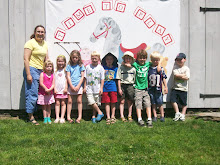A recent post dealt with confidentiality, today let's talk about secrets. Same thing? Not really.
Confidentiality is a very serious grown-up subject. It's all about protecting your organization. Keeping any internal nastiness behind closed doors - where it belongs.
Secrets are fun. Secrets are about keeping a wonderful project under wraps until the big unveiling or planning a surprise party for an Executive Director's 90th birthday or even deciding on the perfect thank-you gift for your volunteer of the year.
Today was full of secrets at the Historical Society - all fun, wonderful secrets - which made for a fun wonderful day.
And just like confidential issues should be carefully and judiciously shared with people who can help make the situation better, secrets can and should be shared with just the right group and number of people.
Today's secrets focused on the art that we will be unveiling for this summer's exhibition. Who needs to see it ahead of time? Who needs to be kept in the dark?
We couldn't show everyone - then it really wouldn't be a secret.
Could we show everyone connected to our organization? Members, donors, Facebook Fans? In this case no. It would spoil the surprise at the Preview Party.
In the end we settled on Board Members and Committee Members, a total of about 20 people who have been sworn to secrecy but who will share their excitement and enthusiasm for the artwork, the exhibition and the companion book with their family and friends.
Everyone who learned our secrets today felt special. Honored, trusted and connected to the organization in a very intimate and important way. They might even be even better volunteers than they were before because of the secrets we shared.
And if they slip and share the secret with a spouse or a best friend - no real harm is done. The circle of support gets wider and the excitement grows.



